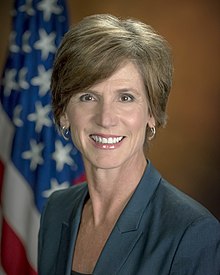Sally Yates | |
|---|---|
 | |
| Acting United States Attorney General | |
| In office January 20, 2017 – January 30, 2017 | |
| President | Donald Trump |
| Preceded by | Loretta Lynch |
| Succeeded by | Dana Boente (acting) |
| 36th United States Deputy Attorney General | |
| In office January 10, 2015 – January 30, 2017 | |
| President | Barack Obama Donald Trump |
| Preceded by | James M. Cole |
| Succeeded by | Rod Rosenstein |
| United States Attorney for the Northern District of Georgia | |
| In office March 10, 2010 – January 10, 2015 | |
| President | Barack Obama |
| Preceded by | David Nahmias |
| Succeeded by | John A. Horn |
| In office Acting: July 1, 2004 – December 1, 2004 | |
| President | George W. Bush |
| Preceded by | William S. Duffey Jr. |
| Succeeded by | David Nahmias |
| Personal details | |
| Born | Sally Caroline Quillian August 20, 1960 Atlanta, Georgia, U.S. |
| Political party | Democratic |
| Spouse | Comer Yates |
| Children | 2 |
| Education | University of Georgia (BA, JD) |
Sally Quillian Yates (born Sally Caroline Quillian; August 20, 1960[1]) is an American lawyer. From 2010 to 2015, she was United States Attorney for the Northern District of Georgia. In 2015, she was appointed United States Deputy Attorney General by President Barack Obama. Following the inauguration of President Donald Trump and the departure of Attorney General Loretta Lynch on January 20, 2017, Yates served as Acting Attorney General for 10 days.
Trump dismissed Yates for insubordination on January 30, after she instructed the Justice Department not to make legal arguments defending Executive Order 13769, which temporarily banned the admission of refugees and barred travel from certain Muslim-majority countries (later to include North Korea and Venezuela) on the grounds that terrorists were using the U.S. refugee resettlement program to enter the country. The ban was labeled as a "Muslim ban" by both Trump and his campaign's website.[2][3] Rather than defend it, Yates stated the order was neither defensible in court nor consistent with the Constitution.[4][5] Although large portions of the order were initially blocked by federal courts, the Supreme Court ultimately upheld a revised version.[6]
Following her dismissal, Yates returned to private practice. She was considered a candidate for Attorney General in the Biden administration.[7]
- ^ Vernoica Stracqualursi (May 8, 2017). "Everything you need to know about former acting Attorney General Sally Yates". ABC News.
- ^ Johnson, Jenna (December 7, 2015). "Trump calls for 'total and complete shutdown of Muslims entering the United States'". The Washington Post. Retrieved December 12, 2018.
- ^ Barbash, Fred (May 9, 2017). "Muslim ban language suddenly disappears from Trump campaign website after Spicer questioned". Washington Post. Retrieved July 30, 2019.
- ^ Perez, Evan; Diamond, Jeremy (January 30, 2017). "Trump fires acting AG after she declines to defend travel ban". CNN. Retrieved March 12, 2018.
- ^ Cite error: The named reference
Landlerwas invoked but never defined (see the help page). - ^ de Vogue, Ariane; Stracqualursi, Veronica (June 27, 2018). "Supreme Court upholds travel ban". CNN. Retrieved December 5, 2019.
- ^ Barrett, Devlin; Zapotosky, Matt. "Biden searches for attorney general to restore Justice Dept.'s independence, refocus on civil rights". The Washington Post. ISSN 0190-8286. Retrieved November 26, 2020.